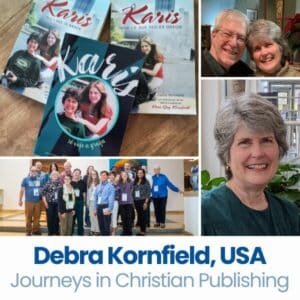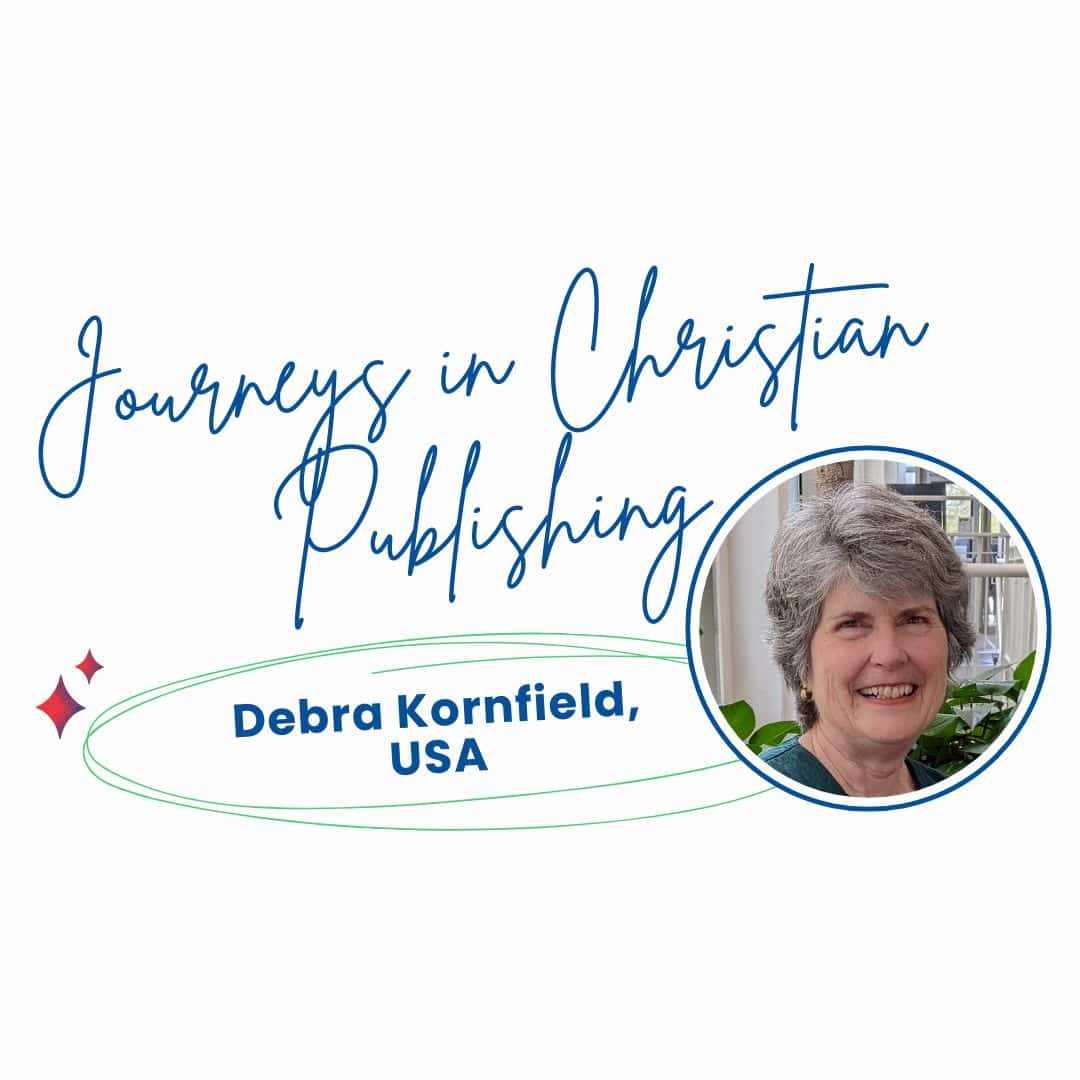Missionary and author Debra Kornfield shares the ways in which books have played a significant part in her faith journey, lessons learned through years of ministry and personal experience of trauma, and tips for missionaries who want to write books. “You never know who will read what you write,” Debra says. “Build bridges, not walls.” This story is part of the Journeys in Christian Publishing: Stories from LittWorld series.
In what ways have books played a part in your coming to faith and spiritual growth?
I am the fourth of eight children of missionary parents, whose intent was to translate the Scriptures into Nebaj Ixil of Guatemala, a language not yet written down when my parents went there in 1953. I grew up in what was then an isolated mountain village. When I was a child, we often did not have electricity. The only telephone was at the post office.
Books, taken to our home by our parents, became one of our only sources of information and learning and connection to the world outside of our small community.
When our eldest sister moved to the United States for high school, she understood our hunger for books. I will never forget her sending us, one by one, C.S. Lewis’ Narnia series.
Through The Lion, the Witch, and the Wardrobe, the gospel—which I had of course heard all my life—began to make sense to me.
Edmund, seduced by the witch’s attention and gifts and exploitation of his need to be recognized among his siblings as someone who “mattered,” commits treachery.
Aslan, through a devastating contract with the witch, pays with his life to redeem Edmund from slavery to her.
Yet there is a “deeper magic” which defeats the witch and shows Edmund he indeed matters—so much that he can be forgiven and find he has an important place not only in his own family but with the citizens of Narnia.
All of this resonated deeply with me, a middle child in a large family whose parents’ focus on ministry had failed to communicate effectively to me the truth of God’s personal and profound love.
All of us children were educated at a boarding school several hours away from home. A shy child, I found refuge in books. The school library multiplied many times over the resources available to me at home. I believe I read every book and re-read a large number.
Books taught and shaped and discipled me in my faith. In this regard, I remember particularly a devotional series for children about “Pete and Penny” by Dorothy G. Johnston (Moody Publishers). Through Pete and Penny’s adventures, they learned about God’s love and faithfulness. Many other books as well instilled in me the confidence that God “saw” and cared about me.
How did the Lord lead you into your current ministry with One Challenge?
When we married, my husband David and I shared a deep commitment to missions. We searched for an interdenominational mission agency that worked through teams to encourage and mobilize national leaders while prioritizing the family and found this in One Challenge (Overseas Crusades at the time). Dave’s passion for caring for pastors and their families developed into Discipling and Pastoring of Pastors (DPP).
Along the way, we realized that many pastors in Latin America carried deep emotional wounds. This led to establishing a lay ministry called REVER (the acronym in English translates as Restoring Lives, Equipping Restorers).
REVER quickly expanded to address the needs not just of leaders but of church members, and to our surprise became a major evangelistic vehicle as well. God impressed on me the plight of victims of sexual abuse, a taboo subject in Brazil and Latin America at the time but with lasting consequences in the lives of those who suffered in this way.
One of the first books I wrote and published in Brazil, Vítima, Sobrevivente, Vencedor (Victim, Survivor, Victor) is used in Brazil and in several Spanish-speaking countries as a guide to recovery through the support of small groups.
REVER brought to Brazil and Latin America several helpful resources, such as books on healthy boundaries by Cloud and Townsend, The Father Heart of God by Floyd McClung, and Diane Langberg’s groundbreaking books about counseling and sexual abuse recovery.
Under national leadership for more than twenty years now, REVER continues its ministry to emotionally wounded people across the continent.
Last year, REVER Latin America hosted its first international Congress in Spanish and invited its “grandparents” (Dave and I) to be the speakers. There is perhaps no greater joy than to see one’s “grandchild” flourishing and hear countless testimonies of God’s healing. We praise God.
Please share 3 things (can be more than 3) the Lord has taught or shown you in your journey so far.
Perhaps the biggest challenge in my life has been the care for and death at thirty years of our daughter Karis, born with a rare intestinal anomaly. Her faith and confidence in the Lord through intense and unrelenting suffering and loss taught me so much about submission to God’s sovereignty and trust in his purposes—and the fragile curtain that separates life on this earth from life in heaven.
I paid a huge personal price for not learning much earlier in my life to respect my own needs and limitations, caring for myself so that I could better care for Karis and for other people. Though it took me much longer than it took for Karis, I can now say with her, “All I see is grace.” I learned through her journals—she left behind a complete set, from age nine to the week before her last coma—that she wanted her story told, to honor the Lord.
Because the emotional challenge for me was so great, it took me four years after her death to publish in 2018, Karis: All I See Is Grace (Westbow Press), now available as well in Portuguese and Spanish.

God is stretching me currently in recognizing the importance of women’s voices. Not the strident, competitive, militant voice often associated with feminism, but the gentle, loving, healing voice of women confident in their preciousness to God and of his passion to recognize and care for both their wounds and their unique contributions to the Kingdom of God.
Many women in Latin America still suffer from the false belief that they are inferior to men, created simply to be used by men. If I write another book, perhaps this will be the theme, though after discovering through the Cally and Charlie series the joys of writing fiction, that will most likely be the genre I choose.
Please share your top tips for missionaries who want to write books.
Many missionaries (I include myself) have stories to tell of trauma and suffering. Writing can be important to our healing, but we should not publish or widely tell our stories in order to heal or as an attempt to attract empathy. We should tell them once God has healed us, to offer our readers a pathway to healing. Otherwise, we are simply adding to the trauma of this broken world, and perhaps triggering additional suffering for those who have had experiences similar to ours.
The right time and way to tell our stories requires discernment which we may not possess adequately on our own. We need the perspective of other people who know us and can offer us their wisdom.
Writing well is an art. It requires practice. Do you know how to write well? If not, I encourage you to engage an excellent writer or editor to help you. I have seen books published by missionaries and pastors with important stories and spiritual wisdom to share, but whose message is compromised through inadequate writing skills. This does not honor our Lord.
Even didactic writing profits from storytelling, to engage readers and illustrate concepts. Use care, though, not to write off or “demonize” groups of people. You never know who will read what you write.
Build bridges, not walls. God calls us to love our “enemies,” not to antagonize or offend people for whom he died and to whom he offers his grace. I will never forget Corrie ten Boom’s offer of forgiveness to a Gestapo officer.
What do you see as the greatest opportunities in mission publishing?
The internet! Though personally I still love paper and ink, the ability to share a message across borders has never been greater.
How might we pray for you and your ministry?
Pray that I will daily discern how God wants me to use my time and energy, for however long he wishes for me to continue on this side of heaven. I realize I do not understand the risks and obstacles to sharing their writing that many believers face around the world. May the Lord continue to inspire, protect, and resource the writing plans he has for you.
Additional resources
- Debra and a group of women leaders from several countries have written an eight module study called La Mujer Sabia (“The Wise Woman”), now available in Spanish and Portuguese. Please contact Debra at [email protected] for a copy.
- How to Write Biographies of Local Heroes of Faith – a webinar with Jojie Wong
- A Story to Tell: Writing the Collaborative Memoir – a webinar with Jeanette Windle

